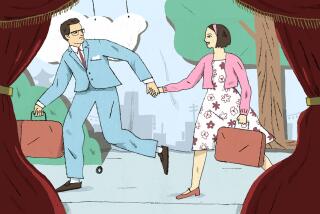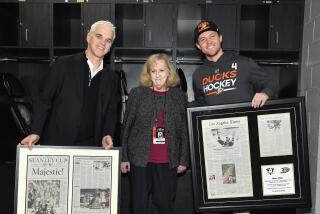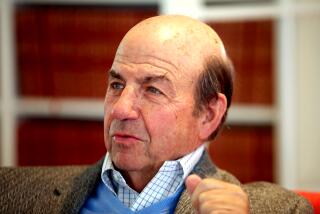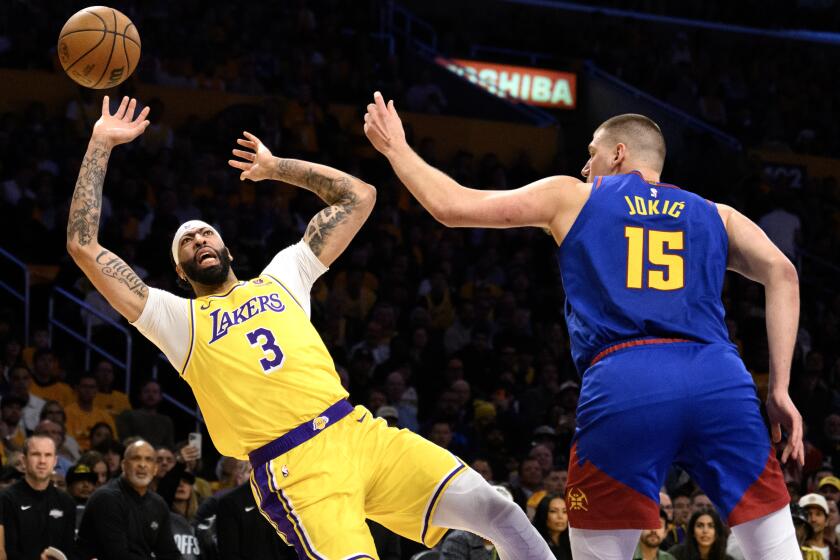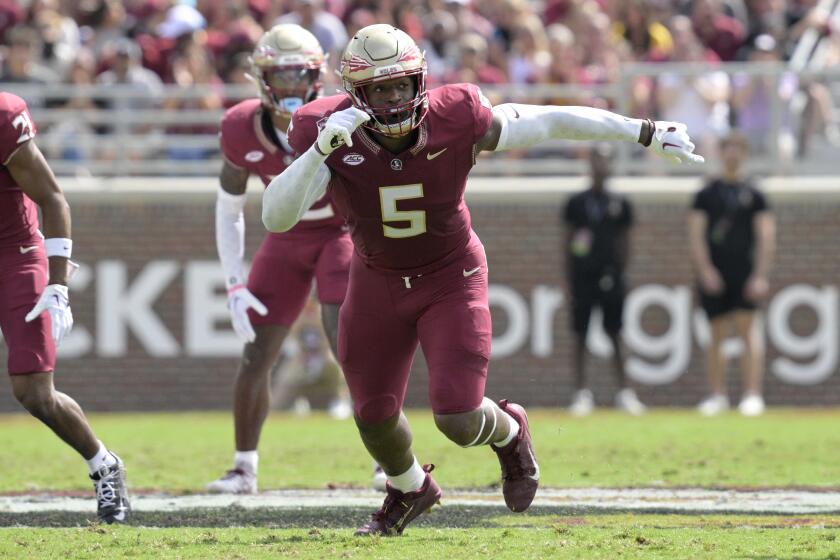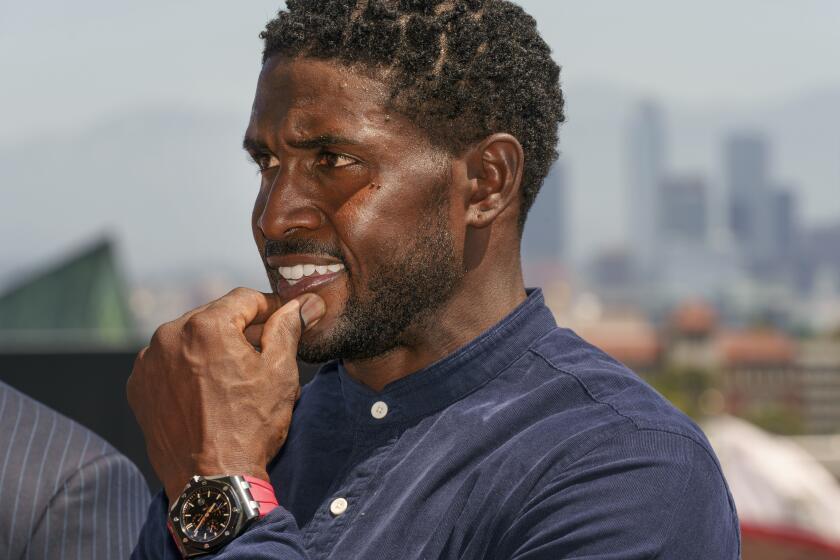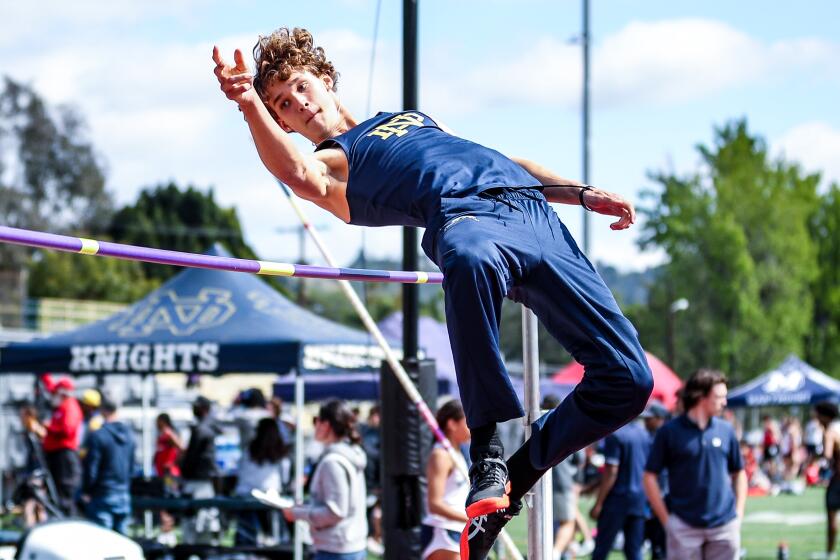Column: Journalism professor’s lessons live on
It was 37 years ago when we met, a frightened student and a rumpled teacher in an awkward moment that changed a life.
It was a hot early summer day in the rural Midwest, and I was wandering the empty halls of Southern Illinois University Edwardsville, a state college in a swatch of pastures and woods down the highway from my parents’ home. It was the only place that would take me, the only place I could afford, a commuter school where I was initially housed in a dank church basement next to a reeking oil refinery.
After enrolling with a few strokes of a pen, I wandered to the small cubbyhole that housed the school’s journalism department. At that point in my 18-year life, having failed at sports, music and math, I possessed but one skill. I could write badly. That is to say, I had written countless sports stories lacking any sort of originality, filled with cliches and statistics. But I loved it so much I kept writing, submitting reams of copy to high school and neighborhood newspapers, relentless in my failure.
It was with this ill-placed confidence that I walked into that cluttered closet to announce my presence. That’s where I first saw him, a middle-aged man who appeared to be a combination of Albert Einstein and Mr. Peabody, piles of frizzy white hair atop black horn-rimmed glasses, dressed in mounds of corduroy and surrounded by piles of newspapers.
His name was Bill Ward. He put down his red pen, tilted his head in my direction, and glared. I was overcome with such fear and insecurity, I blurted out words so bold that even I couldn’t have possibly believed them.
“I’m going to be the best writer to ever come out of this department!” said the kid who wrote badly.
Professor Ward’s glare slowly became a soft smile, followed by what sounded like a sarcastic chuckle. He then delivered a most enduring message, not only in what he said, but what he didn’t say.
He didn’t tell me was I wrong. He didn’t tell me to get lost. He didn’t discourage me with the obvious reality that I was a nobody in the middle of nowhere.
He simply looked at me from over his glasses and said, “We’ll see.”
For a lost kid with no resume, it is impossible to describe how empowered I felt by the words, “We’ll see.” With that statement, Professor Ward had created an environment where everyone would be given a fair chance, where even the worst of budding journalists would be evaluated with no judgment, no bias, and best of all, no ceilings.
Professor Ward’s first lesson was that it was OK to dream. And then he taught me to write.
Those human interest stories that appear in this space often enough to make hardcore sports fans shudder ... blame Professor Ward. He insisted sports was never really about sports, but about the people who played them.
“The best thing about sports is its humanity,” he would say. “Write the humanity.”
Those short sentences and paragraphs in this column that drive everyone nuts ... Professor Ward again. He taught me to write as if I were having a conversation with readers around a campfire, nudging, explaining, infuriating, using my words to make them laugh or cry or think.
“Write like you talk,” he would say, and by now most folks know I talk fast and in spurts.
Those descriptions that sometimes color my writing a deep shade of purple and make even me wince? Yep, Professor Ward, who had a simple mantra that I follow today.
“Show me, don’t tell me,” he would say.
Professor Ward taught those lessons to a generation of budding SIUE journalists with a loud snort and an iron fist. He was my toughest editor. He was my harshest reader. He ran our small and obscure department as if it were a daily newspaper. If your copy was filled with typos or misspellings, you flunked the assignment. If you missed any deadline, you flunked the project.
He once flunked me in beginning photography, a required course. He considered that skill vital for any journalist who wanted to paint pictures with words. The next semester, in order to graduate, I was ordered to take my cheap camera into nearby East St. Louis and essentially live with a high school track phenom named Jackie Joyner. I slept outside her house. I photographed her for three days. She won’t remember me, but her name belongs on my diploma.
I don’t think I ever received an A. I don’t think I ever even received an attaboy. Professor Ward had so much faith in me, in everybody, that we could never be good enough to justify it. I thought my sights were set impossibly high. He set them higher. Show up earlier than everyone. Stay later. Work harder.
During my junior year he encouraged me to apply for 50 internships. I received one response. Undaunted, the following year, he encouraged me to apply for 50 more. Again, I received one response. He kept saying it was fine, that all I needed was one person to believe in me. He knew, because he was often that person.
During my senior year I worked for several small-town papers and the St. Louis Globe-Democrat, all at once, to pay for tuition. To hide these obvious conflicts of interest, I sometimes wrote under a pseudonym. My byline was “Ward Embro.” I was eventually caught and fired by one of the newspapers. Professor Ward was so proud.
When I finally graduated, I skipped my commencement ceremony, much to the disappointment of my parents, to drive all night to Florida to begin my career. I was two days early for work, and the folks at the St. Petersburg Evening Independent had no idea what to do with me. Again, Professor Ward was so proud.
From that cubbyhole he built one of the nation’s top journalism programs. Our funny four-letter school would regularly beat the likes of Missouri and Northwestern in college writing competitions. They would enter stories about big-time college athletics, and we would enter a Keith Schopp story about a morbidly obese failed college wrestler that began, “The big man laughs.”
It turned out I was not the best writer to study journalism at SIUE under Professor Ward. I’m not even the best Los Angeles Times writer to come out of his program. That would be our investigative reporter Paige St. John, a Pulitzer Prize winner, who would often sneak into a closed mass communications building and spend all night finishing her projects.
“I sense I have not yet fulfilled his aspirations for me,” she said this week.
Another grateful pupil was Chicago Tribune chief political reporter Rick Pearson, who said, “When I’m writing, there’s that devil that sits on my shoulder saying, ‘Is that the best you got, kid?’ That’s Ward.”
From assistant sports editors to law professors to public relations executives, the list of Ward alumni is deep and rich, so much that we filled an entire Edwardsville bar for his retirement surprise party in 1996. A few years later, when I won the Associated Press national sports columnist competition, the first person I called from the press box in Montreal was Professor Ward. I told him I was mailing him the plaque. I was crying through the phone. He was not. He asked me how I thought my writing stacked up against “this Mitch Albom fella.”
I hung up and worked even harder, spending every day of my 18 years as a columnist listening to Ward’s echoes, chasing his lessons, attempting to live up to his faith. I used every typographical trick, every story structure, every word he taught me.
But it turns out, I forgot to use the words that really mattered.
A couple of weeks ago I received an email from a classmate informing me that Professor Ward had died at age 85. I had not spoken to him in a decade. When I went to his Facebook page, I was unable to join other classmates in posting a tribute on his wall. I had not set up a social media connection to him, so I was prohibited from honoring him on his page.
In my grief, I hastily pushed a key that resulted in that box reading “Friend Request Sent.” But that friend was gone forever.
In typical fashion, he didn’t want a memorial service or funeral. His body was cremated and his ashes will be spread across an ocean. There will be no tributes from a pulpit. There will be no tearful goodbyes at an altar. I had many chances to make sure he knew, one more time, how much I loved and respected him, yet I missed each one.
All these years doing what Professor Ward taught me, I made every deadline except the most important one of all.
“He was a hard person to read sometimes,” said his son Jeff. “But he talked about you, he talked about all his students, and in listening to him, I really think he knew he made a difference.”
Did he? Did he still have the plaque? Did he ever look at it and realize what he did for me and how much I appreciated it?
I’ll never know. But perhaps Thanksgiving is a good day to remind others that it’s not too late for them. Seemingly everyone has a mentor or teacher who has been important in his or her life. Find that person. Call them. Write them. Hug them. Thank them.
Twitter: @billplaschke
More to Read
Get our high school sports newsletter
Prep Rally is devoted to the SoCal high school sports experience, bringing you scores, stories and a behind-the-scenes look at what makes prep sports so popular.
You may occasionally receive promotional content from the Los Angeles Times.

